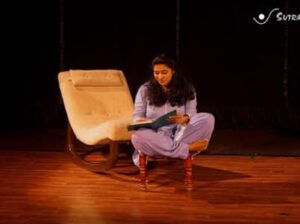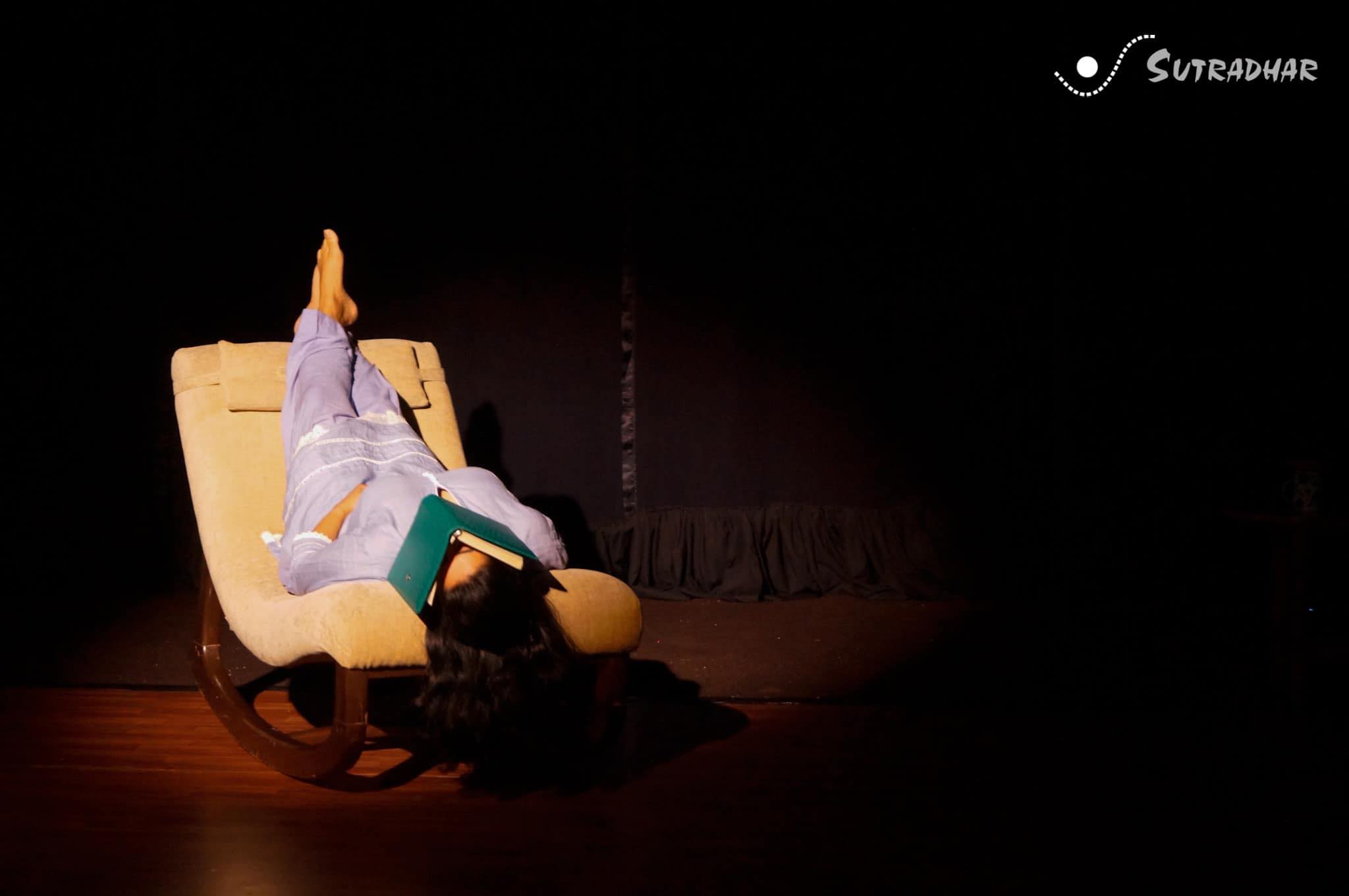After a long forced hiatus due to Covid 19 pandemic, Hyderabad-based Sutradhar came back with a bang with ‘Weekend’ – a theatre play. Ratika Sant Keswani plays the protagonist in the play, which is a classic part of the popular Nirmal Verma’s ‘Teen Ekant’. We bring to you the play decoded by SHILPA ASHOKA, who watched the play when it was staged for the first time on August 1, 2021

Despite growing up in a family and surrounded by plays and artists all my childhood, followed by life’s twists and turns that managed to keep me away, I felt like I had drifted away too far. But it all came back when I witnessed – ‘Weekend’ performed by the immensely talented group Sutradhar. The play written by Nirmal Verma was performed by Ratika Sant Keswani and directed by Vinay Varma.
The introduction by Vinay Varma was apt and crisp. The one-minute silence that we all experienced, remembering all the loved ones we lost during this pandemic, brought all of us in the room, closer. This was most needed, especially during the time that’s keeping all of us at a social distance. Stating the facts about procuring the right permissions, and references to people, brought out the sincerity of the group and conveyed respect for the writers and the profession.
The Play
The show starts with a moment of darkness with Ratika on stage when the lights come slowly. The play begins by establishing the relationship between a man and a woman. And, the fact that they don’t live together. The man’s line ‘yeh hamara ghar hai aur tum hamari ho’ is a way to make her feel at home, in his house. The woman’s description of how it feels when we are in our own room compared to someone else’s is something anyone can relate to. She then continues to give an account of her train journey.
The narration clearly portrays how strongly she feels for the man and how intense her love is. The scene suddenly shifts back to the man’s house, when it moves to where she sits and watches the man play with his child, and the woman goes through different emotions. She gets angry with the man because their relationship is concealed. Her expressions and intensity change so quickly, as it is rightly required to convey what a woman goes through to gain acceptance of existence. This is then followed by fear; fear of losing him, and therefore the helpless cry. The passionate emotions and dialogues that follow this scene flow organically, enacted with much vigour.
The scene then goes back to where the man plays with the child. All this shift is so smooth as if it is a movie. The woman’s longing to be part of the child’s life and the feeling of not being accepted by the child are very easily drawn. The woman noticing fine details about the way the man plays with the child is delivered in a refined manner. The line ‘bade hokar sirf chhoti cheezein yaad reh jaate hain’ is indeed profound.
When the man comes back to her and talks about the child crying, the woman goes through mixed emotions. Her desire to make the man forget about his child, and, the concern for the little child who could still be crying, are like two sides of the same coin. She then speaks about sadness. How it neither goes away nor it piles up – when she says, ‘Wo sirf saaf hota jaata hai’ – facing the audience, hands in front of her face, slowly moving away from one another as she utters the word ‘saaf’.
The woman then conveys a sense of contentment when says ‘I can now go back to my room’ – In a way, a contradiction to her willingness to stay with the man. While she watches the man with the child, she comprehends that she is free, unlike the man who is tied up with a family. She wonders about the couples who stay with each other day and night and concludes that this is not for her. The last time she turns back and looks at the man and describes the room is meticulous.
Ratika
Ratika’s entire look was perfect. The tone of her clothes soft as dark colours would not suit the character. Nothing about her appearance was distractive. Her hair was natural and the way she moved it with her hands in different scenes was just right. She looked straight at the audience so many times, right in the eye! As if she was talking to us and it forced us to respond with our eyes. She had tears in her eyes while delivering some intense dialogues and that showed, she was living it.
The Stage
The lighting was never too much, never too less. It moved with the actress and her dialogues as if it spoke too.
Minimal things that were kept, like the mug, glass of water, the rocking sofa, the little stools were all used at different times and felt natural. I observed the way she sat facing us, facing backward, leaning, straight, and sometimes rocking. Every movement went with the emotion that was being conveyed. The recordings, be it the man’s lines or the sounds were all so synchronized that it should have taken hours of practice and toil by the team. It was evident that much coordination went into the show, and this couldn’t have worked unless the team was closely knit, like a family.
When the play ended, the room was filled with claps and appreciation. The entire show, the people all felt so professional and confident! I wish the Sutradhar team can bring many more such plays to the city of Hyderabad.
About Shipa:
Shilpa Ashoka currently works at Vidyaranya High school, Hyderabad. Having quit the IT profession 11 years ago, to pursue her love for education, she is now a full-time storyteller to her own two children. She is also a certified library educator. She has her own little library at home in Himayatnagar with a diverse collection of picture books. She spends most of her time reading to children, enacting stories, and doing art & craft activities with them.
















